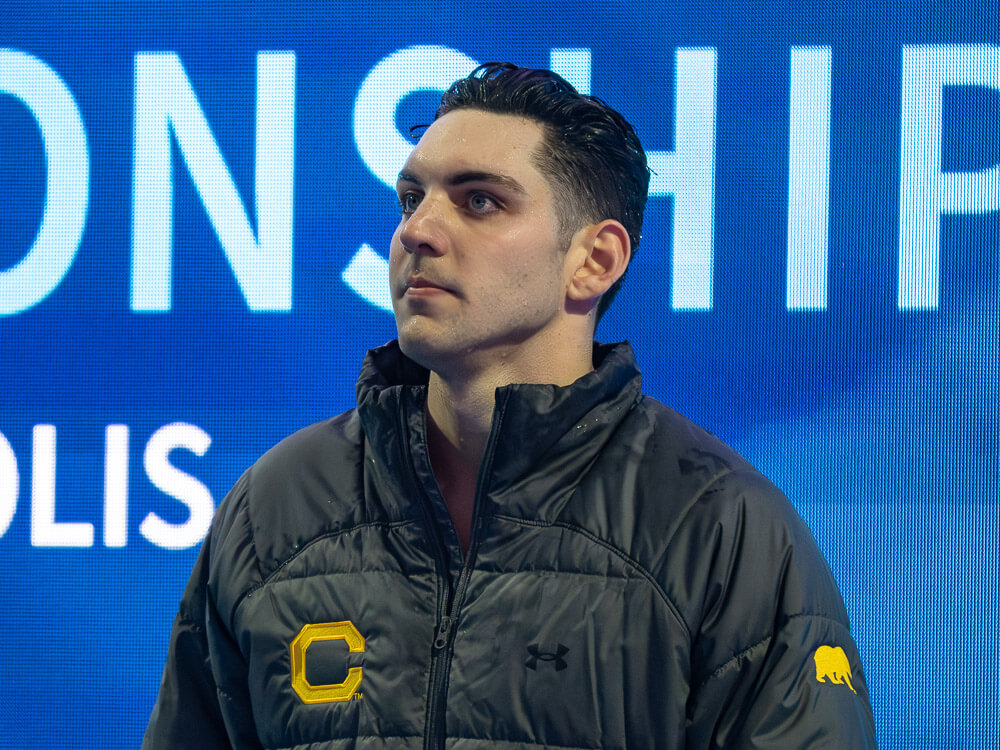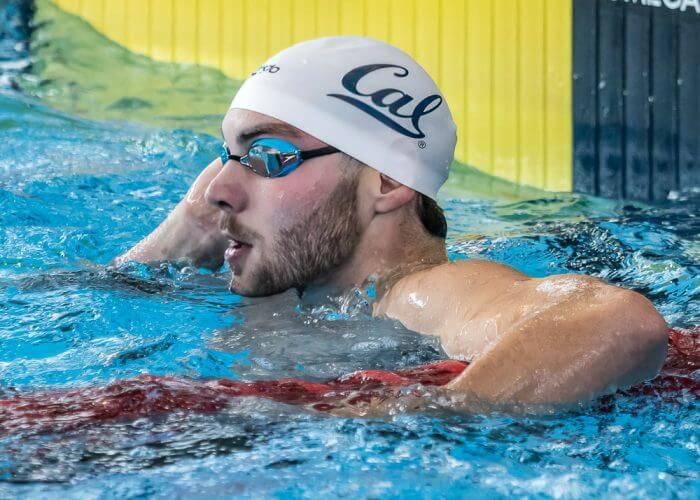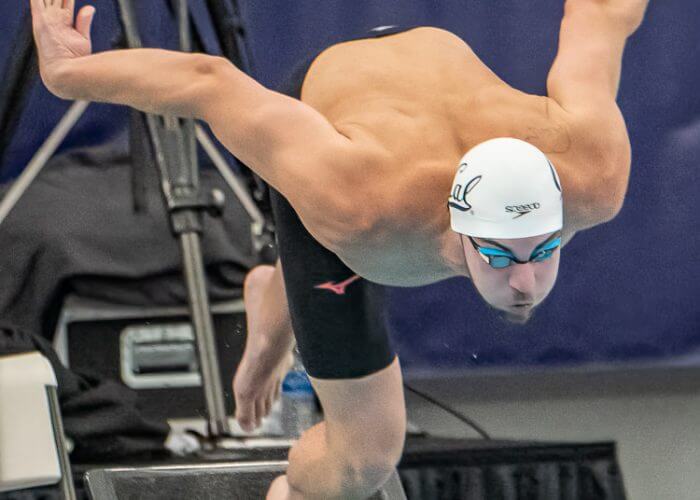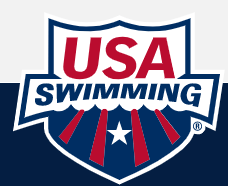With Olympic Trials Curtain Set to Rise, Jack Alexy Looking to Confirm Sprint-Star Status

With Olympic Trials Curtain Set to Rise, Jack Alexy Looking to Confirm Sprint-Star Status
NOT ALL SPRINTERS ARE CREATED EQUALLY. Jack Alexy, for his imposing build and rangy strokes, is not to be confused with a splash-and-dasher. When he makes his hay in the sprints, it’s by outswimming his opponents. And his recent collegiate success in the 200 free—with the anaerobic training that got him to the point of outfoxing distance swimmers at NCAAs—bodes very well for his hopes of a big Olympic break this summer.
BY MATTHEW DE GEORGE
As he appraised his recent performance at the men’s NCAA Championships, Cal’s Jack Alexy wore a wry smile. The whisper of a grimace spoke to expectations of his past. The mirth stemmed—as much as from exhaustion after four days of competition—from looking forward.
Alexy is a sprinter. No one will question that. And when all was said and done at the IUPUI Natatorium last March, the University of California junior counted two valuable entries to his sprinting résumé: bronze medals in the 50 and 100 freestyle.
But his best result—runner-up in the 200 free—wasn’t something he necessarily expected. By the end of this summer’s Olympics in Paris, it may well prove the most consequential and prescient of swims.
“I think I’m really surprised that was my highest-placing event,” Alexy said before departing Indianapolis. “I think it’s going to correlate really well long-course to the 100 free.”
BUILDING A BUILD
Alexy’s rise among the American ranks has been a steady, prototypical climb. As an 18-year-old at Olympic Trials in 2021, the New Jersey native served notice not by making a final, but by taking down a Caeleb Dressel national age group record in the 100. Ultimately, it would land him 10th in the 100 free, 17th in the 50 free and 33rd in the 100 backstroke. With Berkeley next on the itinerary after Omaha, there was room to grow beyond his 6-8 frame.

Photo Courtesy: Peter H. Bick
It didn’t come right away, though. Alexy was seventh in the 50 free and ninth in the 50 back to offset a disappointing 24th in the 100 free at U.S. Team Trials in the summer of 2022. That season, he didn’t get anywhere near the best time of 48.69 he set at Trials in 2021, his first break of 49 seconds.
That merely delayed his coming-out party to the next summer. At Phillips 66 Nationals in 2023, he got under 48 seconds for the first time—a 47.75 in prelims. He was slower in the final, but won, nonetheless, in 47.93. He took second in the 50 free in 21.63.
It booked passage to Worlds in Fukuoka, where he held up marvelously under a heavy program. He bounced back from a disappointing team performance in netting bronze in the men’s 400 free relay on Day 1 to claim silver in the 50 free and 100 free, the latter in 47.31. He would also add the customary gold in the men’s medley relay with little consternation to go with silver in the mixed 400 free relay (with a flat-start 47.68 off the front).
Perhaps most tantalizing is how Alexy went about all those medals. His front-end speed in the 50 free was on display, and while no match for Cameron McEvoy, the 21.57 put him among the biggest names in the world. His times in the 100 covered a broad range—out as quickly as 22.26, back as quickly as 24.83. He attacked the 400 free relay in that fastest 50, but only had 25.30 coming home. When he went out slow in the semifinals of the 100 free in 22.98, thanks to a disastrous start, his back-end speed also wasn’t there at 25.08.
The butter zone seems to be in the middle. His silver in the 100 free came from Lane 8. He went out in 22.48 and came back in 24.83. His first 50 was the fastest in the field, then he came back with the fifth-fastest time. That appears to be Alexy’s pathway to the times he wants in the 100, going out in 22-low and back in 24-high—times that position him to challenge for medals and push the 47-point barrier that will likely be required for the medal stand in Paris.
IN THE POOL
Alexy’s journey over the last two years paints the picture of a swimmer secure in his identity in the water, even if it can still generate a pleasant surprise here or there. The training he’s done at Cal is designed to accentuate that.
For much of the group in Berkeley, the focus in the early part of 2024 turned to long-course training. Even in the leadup to NCAAs, when the group traveled to the Olympic Training Center in Colorado Springs to train at altitude, the program centered on long course, with just a brief refresher in yards before NCAAs. It seemed to work just fine for Alexy and Destin Lasco, the 200 individual medley/200 back champ at NCAAs, who picked up medals for the runner-up Golden Bears while still prepping for the long-course summer.

jack-alexy-
The aerobic workload suits Alexy just fine. It was one of the reasons why, when pondering his third event at NCAAs, he looked at the 20th and 36th places he’s landed in the 100 back each of the last two years and was open to changing his Friday slate.
“This whole year has been a lot better at aerobic swimming,” Alexy said. “The main focus is the 100 freestyle long-course and having that back-end speed. That training has correlated to training 200 free short-course. I didn’t focus too much on racing strategy or specifically 200 free training up until maybe February or January. I had a few dual-meet swims, and that kind of put that in my mind that I could swim it at NCAAs and score some points.”
With the 1:29.75 in the 200, Alexy scored his best career NCAAs finish, even with the runner-up result in the 100 free as a sophomore. “I really felt the aerobic speed there, and it was fun racing,” he said. It probably won’t make him a contender even for relays at Olympic Trials in the 200—his best time in the long-course 200 free is 1:53.60 from 2018; he went 2:15.50, albeit during heavy training, in March’s TYR Pro Swim Series in Westmont. In a crowded field of contenders around 1:46 this year, that’s too big a jump.
But Alexy has arguably the highest upside of the band of contenders in the 100 free. Dressel is the obvious wild card, and were it not for relay placement, the 100 free might be the event he’d pull back on if looking to trim his program, with longer odds than either the 100 butterfly or 50 free to see him add to his seven career Olympic gold medals. Alexy (along with Chris Guiliano and Matt King) is firmly in the group of swimmers in their early 20s who have taken the step from elite NCAA swimmers to international contenders. Some of the older generation—Dressel, Ryan Held, Brooks Curry—remain contenders. But the 100 free is rife for someone like Alexy to stamp his authority on it.
His swims at NCAAs illustrate how good of a place, physically and mentally, he is to mount a charge at that status and at Olympic medals in Paris.
“I think specifically the 50 and even the 100—it’s a lot about power, especially short course: power, underwaters,” he said. “I know I’m a swimmer on top of the water. That’s really exposed in long course. I’m really happy that the 2-free worked out for me and I could put a good time down, because it not only showed me that I can control my speed in the front half, but I can bring it home with some speed. It also shows I can swim the 200 yards, translate it over to long course, and be ready for this summer.”

- PSYCH SHEET
- HOTEL INFORMATION
- LIVE RESULTS
- MEET INFO
- TV SCHEDULE
- DAY 1 PRELIMS RESULTS
- DAY 1 FINALS RESULTS
- DAY 2 PRELIMS RESULTS
- DAY 2 FINALS RESULTS
- DAY 3 PRELIMS RESULTS
- DAY 3 FINALS RESULTS
- DAY 4 PRELIMS RESULTS
- DAY 4 FINALS RESULTS
- DAY 5 PRELIMS RESULTS
- DAY 5 FINALS RESULTS
- DAY 6 PRELIMS RESULTS
- DAY 6 FINALS RESULTS
- DAY 7 PRELIMS RESULTS
- DAY 7 FINALS RESULTS
- DAY 8 PRELIMS RESULTS
- DAY 8 FINALS RESULTS
- DAY 9 FINALS RESULTS
- FULL RESULTS BOOK



